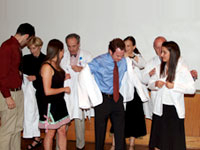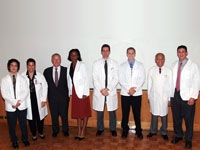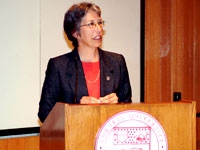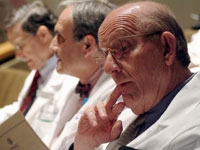
Future physicians begin their medical career at Weill Cornell.
On August 28, family, friends and Weill Cornell Medical College faculty and staff helped welcome the Class of 2008 at the traditional White Coat Ceremony and Opening Exercises. The annual event, part of a weeklong schedule of activities for the new medical students, included inspiring speeches by distinguished faculty members, as well as a reading of the Hippocratic Oath by Dean Antonio Gotto Jr.
Dr. Bruce Ballard, host for the ceremony and associate dean for Student Affairs and Equal Opportunity Programs, began by explaining the historical significance of white coats.
"In the profession of medicine we wear white coats, a form of dress that has become symbolic," said Dr. Ballard. "When patients and numerous others with whom we come in contact see us in these coats, they will expect from us a level of knowledge, expertise, and above all, an attitude of interest and compassion," he said. The Parents and Significant Others Committee donated the coats, which are shorter than the longer white coats worn by physicians.
Sound Advice for New Students

Dr. Michael Kaplitt speaks to the Class of 2008 at the White Coat Ceremony.
Dr. Michael Kaplitt, assistant professor of neurological surgery, delivered the keynote address, recalling his own experiences as a medical student and offering advice for the students as they begin their four-year journey to become physicians.
"It is exceedingly important to remember every day how lucky you are—not just to be here—but that you are allowed to be a doctor," Dr. Kaplitt said. "You should want to do this for free."
Dr. Kaplitt, who also directs the Laboratory of Molecular Neurosurgery, spoke about what excites and rewards him as a physician and scientist. "A human being allows me to drill a hole in their head while they're awake, and let me probe their brain with a fine electrode to find a spot deep in the brain with about a millimeter of accuracy. If I'm off, I might hurt them. But if I'm on target, I might be able to fix their Parkinson's disease.

Debra Gillers, associate dean for academic affairs, Dr. Lewis Drusin, professor of clinical public health and clinical medicine, Dr. Lyuba Konopasek, assistant professor of pediatrics, and Dr. Thomas Maack, professor of physiology and biophysics and physiology in medicine, help students don their white coats.
"There are few areas where you can find that kind of satisfaction," he continued. "When they are doing well, your patients are going to be very grateful, but you should always be grateful to them for allowing you to care for them."
The Importance of Staying Focused
Dr. Kaplitt reminded students to focus on their own progress and not of their classmates by relating a story of his first swimming race as a child.

Carlos Villa ('08), Dr. Carol Storey-Johnson, Dean Gotto, Eva Umoh ('08), Dr. Michael Kaplitt, Brant Ullery ('08), Dr. Bruce Ballard, and Harma Turbendian ('08).
"It was a 50-yard breast stroke," he said. "I was winning up until the very end, until I looked over at the guy next to me and then he passed me. I was upset, and my father said to me, 'You shouldn't have looked.' That stuck with me. Don't worry about how many years medical school is going to take; don't worry about what people around you are doing; just focus on what you're doing."
Dr. Kaplitt also recalled advice he received during his medical schooling, advice that came when he needed it most. "Somewhere in the fifteenth year of my training, I was depressed and feeling sorry for myself. I was making nothing, working hard, and I thought, when would it end? When am I going to start my life?
"The person I was talking to looked at me and said, 'Don't think about starting your life. This is your life.' It made a huge difference to me. Suddenly I was infinitely happier."

Dean Antonio Gotto recites the Hippocratic Oath to the new students.
In closing, Dr. Kaplitt urged the students to enjoy their experiences at Weill Cornell Medical College. "Make it a part of your life, and try to focus on what will make you happy and how to be a good doctor, and we'll all do our best to help you get there."
Facing the Challenges to Come
Following the White Coat Ceremony, the Opening Exercises included a welcome by Dr. Antonio Gotto and the keynote address by Dr. Katherine Hajjar, chair of the Department of Cell and Developmental Biology and professor of cell and developmental biology, pediatrics, and pediatrics in medicine.

Dr. Katherine Hajjar, keynote speaker for the Opening Exercises, addresses the Class of 2008.
Dr. Hajjar also spoke about her experiences as a medical student, and assured the new class that their fears, uncertainties and questions were a natural part of the learning process.
"Thirty years ago I stood at the same threshold where you now stand, about to begin my own journey of discovery," said Dr. Hajjar. "Like you, I had had a variety of experiences and was told that I was well prepared. But, nevertheless, I was scared to death. Here's a bit of what was running through my mind.
"Will I be able to complete the massive amount of work in medical school? Will I pass out when I see my cadaver in gross anatomy next week? When I see my first patient, will I remember the locus coeruleus, the sphincter of Oddi, the circle of Willis? Will I suffer from dementia from lack of sleep? Will I be in debt for the rest of my life? Will I really make a difference, and will it really all be worth it?

Faculty members convene to welcome the new students at the White Coat Ceremony.
"I'm here to tell you that in spite of my fears, things turned out OK!"
Dr. Hajjar also referred to Homer's "Odyssey" to illustrate the challenges that will confront the new students.
"Like Odysseus, you will be repeatedly tested—when a lab experiment goes awry and the Aeolian winds of frustration may blow you back to your starting point. You may feel exhausted, and you may feel that the journey will never end. But I hope that you will savor each of these steps along the way.
"For every challenge there will be a victory, and your odyssey will make you fully fledged members of the community of medicine," she added. "In the end you will emerge ethical, enthusiastic, humble, knowledgeable, wise and compassionate. And in four years we will assemble again and you will take that ancient Hippocratic Oath, and on that day, it will be a great honor for us, the faculty, to say to you, 'Welcome home.'"
Photos by Weill Cornell Art & Photo.

